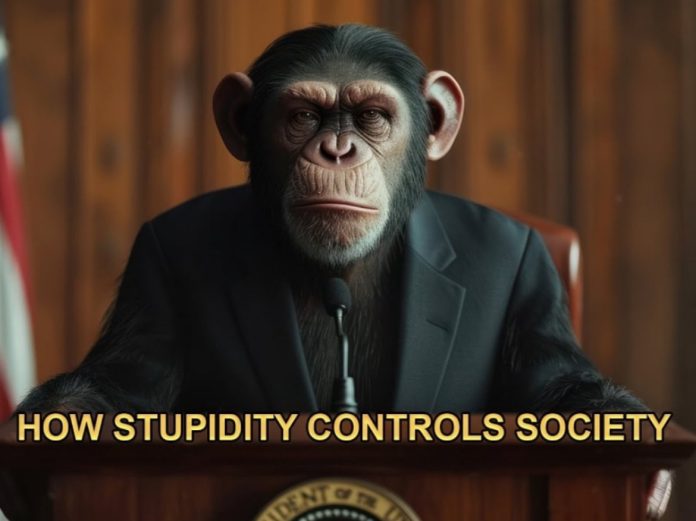Firstly, possibly one of the most important videos anyone will ever watch:
Dietrich Bonhoeffer, the German theologian, philosopher, and anti-Nazi dissident, is widely recognised for his moral courage and deep philosophical insights. Among his most thought-provoking ideas is his ‘Theory of Stupidity,’ articulated while he was imprisoned by the Gestapo during World War II. Bonhoeffer’s reflections on human behaviour under oppressive regimes remain strikingly relevant in today’s world, offering profound lessons on the dangers of blind conformity, the spread of misinformation, and the manipulation of public perception.
Understanding Bonhoeffer’s Theory of Stupidity
Bonhoeffer argued that stupidity is not merely a lack of intelligence but rather a deeper, more dangerous moral failing influenced by social and political conditions. He observed that intelligent individuals could become ‘stupid’ when they surrender their critical thinking to external influences, particularly authoritarian leaders, propaganda, or mass movements. This form of stupidity is not merely an absence of knowledge but a wilful disengagement from independent thought.
According to Bonhoeffer, stupidity is more dangerous than outright evil because, unlike evil, which can often be countered with rational arguments and moral reasoning, stupidity is resistant to both. He noted that those caught in the grip of stupidity are often unaware of their own condition, making them impervious to logic and reason. In this state, they are more likely to repeat simplistic slogans, accept irrational policies, and justify contradictions, all while remaining convinced of their own righteousness.
Bonhoeffer also linked the phenomenon of stupidity to the dynamics of power. He observed that people tend to become intellectually passive when they are absorbed into a group or placed under an oppressive system. The more an individual succumbs to external authority, the less they feel the need to engage in independent thinking. As a result, entire societies can be manipulated into complicity with harmful ideologies or policies, not through malevolence but through a conditioned inability to think critically.
The Modern-Day Parallels
In the digital age, Bonhoeffer’s observations are more relevant than ever. The rise of misinformation, social media echo chambers, political polarisation, and mass propaganda demonstrates how easily individuals can be led into intellectual passivity. Some of the most pressing modern manifestations of his theory include:
1. The Spread of Misinformation and Conspiracy Theories
Social media platforms have become breeding grounds for misinformation, where individuals share and believe falsehoods that align with their biases. The spread of conspiracy theories—ranging from vaccine scepticism to climate change denial and fabricated political scandals—exemplifies Bonhoeffer’s argument that stupidity makes people impervious to facts. Instead of engaging with evidence, many cling to emotionally charged narratives that reinforce their pre-existing beliefs.
2. Blind Partisanship and Political Extremism
Bonhoeffer’s theory helps explain why many people today uncritically defend political figures or ideologies, even when they are presented with clear contradictions or unethical actions. Political discourse has become increasingly polarised, with many refusing to engage with opposing viewpoints or consider alternative perspectives. This form of intellectual blindness leads to tribalism, where loyalty to a party or leader overrides reason and moral considerations.
3. Corporate and Institutional Compliance
In large corporations, bureaucracies, and other institutions, individuals often exhibit a form of ‘learned helplessness,’ complying with unethical policies simply because they are following orders. Bonhoeffer warned that people under authoritarian or highly structured systems often stop thinking independently, justifying their actions by appealing to authority rather than moral reflection. Examples of this include corporate scandals, unethical business practices, and government policies that harm the vulnerable while being upheld by a passive workforce.
4. The Role of Media in Shaping Public Perception
Modern media plays a critical role in fostering or combating the kind of stupidity Bonhoeffer described. News outlets with strong ideological leanings often shape public perception in a way that discourages independent thought. Sensationalist journalism, selective reporting, and biased framing contribute to a culture in which individuals accept narratives uncritically rather than engaging in nuanced analysis. This leads to a fragmented society where people exist in informational bubbles, consuming only content that aligns with their pre-existing biases.
Combating Stupidity with Courage and Independent Thought
Bonhoeffer believed that the antidote to stupidity is not merely education but the cultivation of moral courage and independent thinking. He emphasised that intelligence alone does not guarantee wisdom; rather, individuals must actively engage in self-reflection and resist the pressures of conformity.
To counteract the dangers of stupidity, individuals and societies must:
- Promote Critical Thinking – Schools, universities, and media institutions must prioritise education that encourages analytical reasoning, debate, and scepticism of unverified information.
- Encourage Open Dialogue – Societies flourish when people engage in meaningful discussions that challenge their perspectives rather than reinforcing ideological silos.
- Hold Leaders Accountable – Blind loyalty to political or corporate leaders must be replaced with a culture of accountability, where policies and decisions are scrutinised based on ethical and logical grounds.
- Challenge Our Own Biases – Individuals must make a conscious effort to question their beliefs, seek out diverse viewpoints, and remain open to changing their opinions in light of new evidence.
- Develop Media Literacy – In an age of misinformation, being able to discern credible sources from manipulative ones is crucial for preserving democracy and rational discourse.
In summary, Bonhoeffer’s ‘Theory of Stupidity’ serves as a timeless warning about the dangers of intellectual passivity in the face of propaganda, mass conformity, and authoritarianism. His insights remain crucial in understanding how societies can be led astray, not through deliberate malice, but through the gradual erosion of critical thinking and moral responsibility.
In an era marked by digital misinformation, political extremism, and institutional complicity, Bonhoeffer’s observations challenge us to resist the forces that dull our intellect and moral conscience. Only by fostering independent thought, encouraging ethical courage, and holding ourselves and our leaders accountable can we hope to build a society resilient to the perils of ideological blindness.







